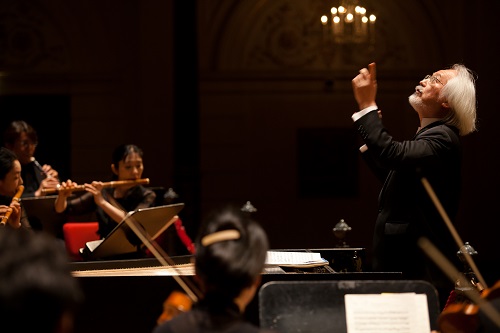 United Kingdom Bach: James Gilchrist (Evangelist), Hana Blažiková (soprano), Damien Guillon (countertenor), Zachary Wilder (tenor), Christian Immler (bass-baritone, Jesus), Aki Matsui (Maid), Yasuke Tamiguchi (Servant), Yusuke Watanabe (Peter and Pilate). Bach Collegium Japan / Masaaki Suzuki (conductor). Barbican Hall, London, 10.3.2020. (CC)
United Kingdom Bach: James Gilchrist (Evangelist), Hana Blažiková (soprano), Damien Guillon (countertenor), Zachary Wilder (tenor), Christian Immler (bass-baritone, Jesus), Aki Matsui (Maid), Yasuke Tamiguchi (Servant), Yusuke Watanabe (Peter and Pilate). Bach Collegium Japan / Masaaki Suzuki (conductor). Barbican Hall, London, 10.3.2020. (CC)

Bach – St John Passion (sung in German)
Just as Masaaki Suzuki has just revisited the St Matthew Passion, some two decades after his first BIS recording, so here he reconnects with the St John Passion. (My colleague Mark Sealey reviews that recent St Matthew on MusicWeb International here.)
And what a powerful interpretation of the St John Passion this was. The acidic oboes of the opening chorus, ‘Herr, unser Herrscher’ penetrated even more than in the BIS recording, their pain reflecting the urgency of the pulsing lower strings as the choir intones ‘Herr!’. This Barbican Bach was pungent, and above all uncompromising. The rapport between Suzuki and his choir is, of course, preternaturally strong (they have, after all recorded, a Bach cantata cycle together) – the choral attack is remarkable, the discipline complete, their evocation of various vocal groups (High Priests, crowd, soldiers) in the Turbae sequences was brilliant throughout, but particularly in the court and trial passages, while the chorales seemed to offer solace to the assembled ‘congregation’ (the audience). A balance between exactitude of execution and pure emotive power was to characterise the evening. The inclusion of a contrabassoon seemed to tie the text’s pain to the very earth itself. The choir’s urgent ‘Wohin?’ contributions to the bass aria ‘Eilt, ihr angefocht’nen Seelen’ were intensively involving, as was the late chorus ‘Ruht voll’, where the sighing gestures were incredibly touching.
Suzuki’s grasp of the score is second to none; the time just fell away as one became absorbed in the tale. Our all-important Evangelist was James Gilchrist, a role he knows inside out and delivered with supreme authority. His work as narrator was superb, the timing perfect, the diction immaculate. But more, we were drawn into the familiar story – familiar, but, as it unravelled in real time, supremely involving.
Christian Immler, who took the Hermit and Voice of Samael in the Insula Der Freischütz (Aix review; Barbican review) here sang Jesus, presenting a very human Saviour. It is true that in this particular Gospel setting, Jesus has a relatively small part, but Immler’s performance was searing in its emotive power.
Damien Guillon is a superb countertenor who, away from the Bach Collegium Japan, also has his own ensemble, Le Banquet Céleste: see their fabulously inventive pairing of Bach and Pergolesi on Glossa – in which Pergolesi’s Stabat Mater is coupled with Bach’s version of that same piece, his Psalm 51, BWV 1083 and the virtuoso solo cantata by Vivaldi, the Nisi Dominus, RV 608. Here his contributions were restrained yet pure; ‘Es ist vollbracht,’ with the voice plaintive and potent, joined by the superb viola da gamba of Rainer Zipperling.
It was wonderful to hear the soprano Hana Blažiková, who has previously appeared on Suzuki’s Bach Cantata series. Her light, beautiful voice illuminated ‘Ich folge dir gleichfals’ from within, in supreme dialogue with the flutes of Kiyami Suga and Liliko Maeda. Zachary Wilder’s sweet tenor nevertheless offered emotional power in ‘Ach, mein Sinn’.
A remarkable, unforgettable evening.
Colin Clarke